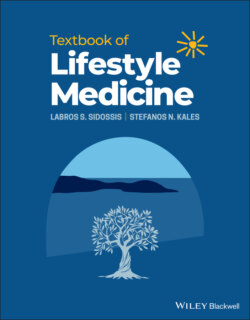Читать книгу Textbook of Lifestyle Medicine - Labros S. Sidossis - Страница 104
Vegetarian Diets
ОглавлениеA vegetarian diet is a dietary pattern based predominantly on plant‐origin products. Vegetarians exclude all kinds of meats (including fowl) and products containing meat from their diet. The most common types of vegetarian diets are: (i) vegan diets, devoid of all flesh foods (such as meat, poultry, seafood, and all animal products); (ii) ovovegetarian, vegan plus eggs; (iii) pesce‐vegetarian, vegan plus fish and seafood; (iv) lacto‐vegetarian, vegan plus dairy products; and (v) various combinations of the above (lacto‐ovo‐vegetarian, ovo‐pescevegetarian). Cereals, vegetables, fruit, legumes, and seeds are common foods to the various types of vegetarian diets. In the recently defined flexitarian or semi‐vegetarian diet, the person follows a primarily but not strictly vegetarian diet and occasionally eats meat or fish.
An individual chooses to adopt a vegetarian diet for several reasons, including the desire to protect the environment and animal welfare; ethical issues of world hunger and specific religious doctrines; and to prevent or mitigate chronic diseases. Results from several epidemiological studies suggest that vegetarian diets have a lower carbon footprint, meaning that they contribute less greenhouse gas emissions compared to diets including meat, making this dietary choice a more environmentally friendly type of a diet.
